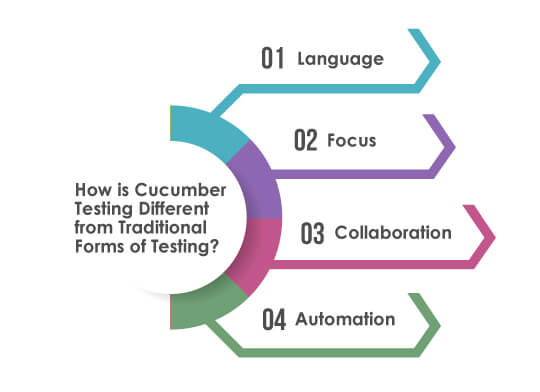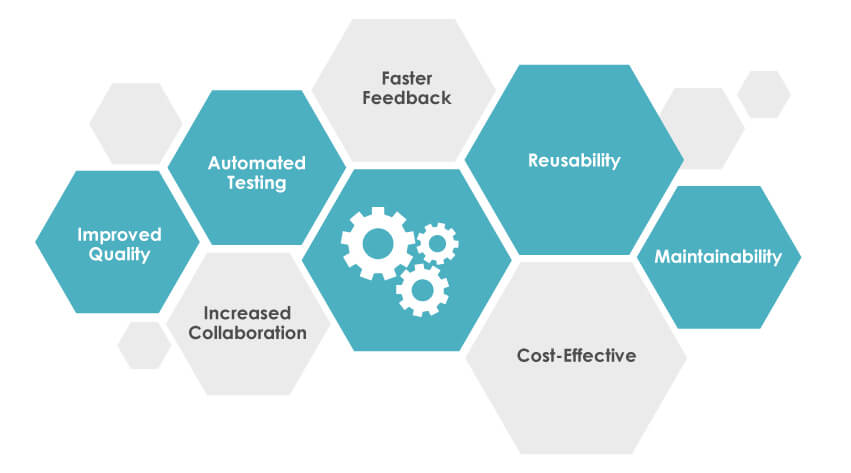Recommended Blogs
Cucumber Testing The Secret Weapon for Effective Software Testing

Table of Contents:
- What is Cucumber Testing?
- How is Cucumber Testing Different from Traditional forms of Testing?
- Benefits of Cucumber Testing
- Why is Cucumber Testing Gaining Popularity Among Digital Businesses?
- Conclusion
- How TestingXperts Helps Businesses with Cucumber Testing?
What is Cucumber Testing?
Cucumber is a testing framework that allows developers to write and run automated tests using natural language syntax. It follows the BDD (Behavior-Driven Development) approach, which emphasizes collaboration between developers, QA, and non-technical stakeholders to define and validate software requirements. Cucumber tests are written in feature files, which describe the desired behavior of a software application using Gherkin syntax. These feature files are then parsed by Cucumber and executed against the application code. Cucumber testing helps improve the quality and reliability of software by providing a common language for developers and stakeholders to communicate requirements and ensure they are met.
How is Cucumber Testing Different from Traditional forms of Testing?
Cucumber testing is a form of behavior-driven development testing that focuses on defining and testing the behavior of an application from a user’s perspective. Traditional forms of testing, on the other hand, typically focus on testing the functionality of an application based on its technical specifications.
Here are some key differences between Cucumber testing and traditional forms of testing:

Language:
Cucumber testing uses a simple, human-readable language called Gherkin to describe the expected behavior of an application. This makes it easier for non-technical stakeholders to understand and contribute to the testing process. Traditional forms of testing typically use programming languages such as Java, Python, or Ruby.
Focus:
Cucumber testing focuses on testing the behavior of an application from a user’s perspective. This means that scenarios are defined based on the actions that a user might take when interacting with the application. Traditional forms of testing focus on testing specific functionality of an application, such as individual methods or functions.
Collaboration:
Cucumber testing encourages collaboration between developers, testers, and business stakeholders. By defining scenarios in a language that is easy to understand, everyone can contribute to the testing process. Traditional forms of testing may be more siloed, with developers writing code and testers writing test cases separately.
Automation:
Cucumber testing can be automated using tools like Selenium or Appium. This makes it possible to run tests quickly and frequently, providing rapid feedback on changes to the application. Traditional forms of testing may be more manual, requiring testers to manually execute test cases.
Overall, Cucumber testing is a collaborative, user-focused approach to testing that encourages frequent feedback and automation. While it may require some initial setup and training, it can be a powerful tool for ensuring the quality and behavior of your application.
Benefits of Cucumber Testing

Improved Quality:
Helps improve the quality of software by identifying bugs and issues early in the development process, reducing the likelihood of defects in the final product.
Increased Collaboration:
Encourages collaboration between developers, testers, and business stakeholders by providing a common language and framework for discussing requirements and testing scenarios.
Automated Testing:
Cucumber testing can be automated, reducing the time and effort required for manual testing and enabling frequent testing throughout the development process.
Faster Feedback:
Provides quick and clear feedback on the status of test cases and helps identify the root cause of failures, allowing developers to fix issues quickly.
Reusability:
Allows the creation of reusable test cases, which can be used across different projects and applications. This reduces the effort required for testing and ensures consistent quality across projects.
Maintainability:
Allows the separation of test cases from the underlying code, making it easier to maintain tests as the application evolves. This reduces the risk of test cases becoming obsolete and helps ensure the continued quality of the software.
Cost-Effective:
Cucumber testing is a cost-effective way to ensure software quality, as it can identify issues early in the development process, reducing the cost of fixing defects later on.
Why is Cucumber Testing Gaining Popularity Among Digital Businesses?
Cucumber testing is gaining popularity among digital businesses because it offers a unique approach to software testing that prioritizes collaboration between technical and non-technical stakeholders. Cucumber is a tool that uses plain text and Gherkin syntax to describe test scenarios in a way that can be easily understood by both developers and non-technical stakeholders. This approach promotes communication and collaboration, which can lead to better software quality and faster time-to-market. Additionally, Cucumber testing can be used for both functional and non-functional testing, making it a versatile tool for ensuring the overall quality of digital products.
Another reason for the growing popularity of Cucumber testing is its ability to automate testing processes. Cucumber allows for the creation of automated acceptance tests, which can be run as part of a continuous integration and delivery (CI/CD) pipeline. This enables teams to catch bugs earlier in the development process, reducing the risk of costly errors and downtime in production. Automation also saves time and resources, allowing teams to focus on developing new features and improving the user experience.
Finally, Cucumber testing is gaining popularity among digital businesses because it supports agile development methodologies. Agile emphasizes iterative development and continuous feedback, which aligns well with the collaborative and flexible approach of Cucumber testing. By incorporating Cucumber into their testing processes, teams can easily adapt to changes in requirements and feedback from stakeholders, ensuring that the end product meets the needs of the business and its users. Overall, Cucumber testing offers a powerful set of tools and techniques that can help digital businesses improve their software quality, speed up their development processes, and stay competitive in a rapidly evolving market.
Conclusion
Cucumber testing is a powerful tool for automating software testing and ensuring the quality of your code. It allows for collaboration between developers, testers, and other stakeholders in the software development process, and promotes a clear understanding of the expected behavior of a system. Cucumber’s user-friendly syntax and ability to generate readable reports make it an ideal choice for teams looking to implement behavior-driven development. By leveraging the power of cucumber testing, teams can streamline their testing process, catch defects early, and ultimately deliver better software products to their users.
How TestingXperts Helps Businesses with Cucumber Testing?
TestingXperts (Tx) is one of the 5 largest pure-play software testing services providers globally. Tx has been chosen as a trusted QA partner by Fortune clients and ensures superior testing outcomes for its global clientele. We have rich expertise in enabling end-to-end testing services for global clients across various industry domains like healthcare, telecom, BFSI, retail & eCommerce, etc.
We provide comprehensive testing services using Cucumber, an open-source testing tool that allows for Behavior Driven Development (BDD) and facilitates collaboration between technical and non-technical team members. Our team of experienced testers can assist with everything from writing feature files to executing and analyzing test results.
Our Cucumber Testing Services Include:
Test Strategy Development:
Our testing experts work with you to understand your business needs and create a customized testing strategy for your application. We ensure that the strategy aligns with your goals and objectives and meets the specific needs of your organization.
Test Planning and Execution:
We help you create detailed test plans and test cases based on your requirements. Our team can execute the tests and provide you with accurate and detailed test results. We also offer automated testing services to help you achieve faster testing and quicker feedback loops.
Test Maintenance:
Our team ensures that your tests are up-to-date and continue to deliver valuable insights. We perform regular maintenance activities such as updating test cases, fixing broken tests, and ensuring that tests are running efficiently.
Integration Testing:
We can help you test the integration of your application with other systems or third-party services. Our team is experienced in testing API integrations, database integrations, and other types of integrations.
Performance Testing:
Our team can assist with performance testing to ensure that your application can handle expected levels of traffic and load. We can help you identify and fix performance bottlenecks before they impact your users.
Security Testing:
We can help you identify potential security vulnerabilities in your application by performing security testing. Our team can help you identify vulnerabilities such as injection attacks, cross-site scripting (XSS), and other types of security flaws.
Test data management strategy:
Our team can help you devise a robust test data management strategy that enables a robust automation framework and more flexible scripts.
Discover more
